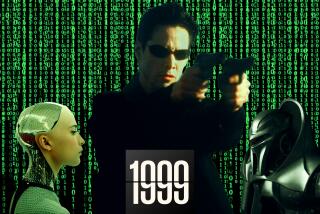MOVIE REVIEW : Reconstructed ‘Blade Runner’ Returns to Screen in Full Glory
- Share via
The reconstructed “Blade Runner,” finally opening today at the Mann Village, may be the best “new” American movie released this year. Set in its spectacular dystopian Los Angeles, enveloped in high-tech shimmer, a gaudy mix of Wonderland and rain-drenched City of Night, director Ridley Scott’s adaptation of the Philip K. Dick novel “Do Androids Dream of Electric Sheep?” had one of the most spellbinding “looks” of any modern movie. Its script, by Hampton Fancher and David Peoples (“Unforgiven”), was unusual. But its vision was unique: film noir cubed, science fiction a step beyond “2001.”
The tale of a moody cop (Harrison Ford) pursuing a gang of four androids (Daryl Hannah, Joanna Cassidy and Brion James, led by Rutger Hauer), whose major crime was simply aspiring to be human, caught its audience on a primal, dreamlike level.
Scott’s final version, slightly different from the “director’s cut” that broke house records last year at the Nuart, gives us the vision unfiltered. The droning, tack-on “explanatory” narration, which pushed the audience too much toward Ford--and perhaps kept us from truly appreciating his performance--is gone. The mood and melancholy have been heightened, and the film builds to its different, properly ironic climax. Seeing it now, in the light of Scott’s “Thelma & Louise,” “Blade Runner” more obviously becomes a poem of alienation, rebellion and its consequences: of exploitation and institutionalized brutality, of a world teetering on apocalypse.
The androids are finally sympathetic; their pursuers odious. And all around them both is a world startling in its contrasts: vital yet decaying, nightmarish yet bewitching, sophisticated but brutal.
More to Read
Only good movies
Get the Indie Focus newsletter, Mark Olsen's weekly guide to the world of cinema.
You may occasionally receive promotional content from the Los Angeles Times.










